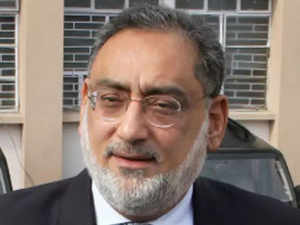
Your views on the GST debate please.
There is an interstate issue. To call GST Council an advisory body is a bit off. It is a decision making body and it did bring about huge legislative changes, unprecedented in any tax regime. When we are talking of tax sovereignty, we were talking of indirect taxes because let us not blame GST for that.
The congenital imbalance rests in the Constitution of India. It is not a creation of the GST Council. The battle to fight should be about centre-state relations — the way Finance Commission, for instance, behaved in a completely irrational manner. Let us not tag that on to GST.
The imbalance in indirect taxes is a creation of the Constitution of India. It is not a creation of GST. We are looking at GST as a tax regime, as an economic policy regime which had certain objectives some of which have been fulfilled, some of which have not.
Take one example — the widening of the tax base. 48% of the tax today is collected from 0.1% of the GSTNs, 77% of GSTN is coming from 7% of the taxpayers, 0.52% of the total GSTN taxpayers contribute 64% of total corrections. It has not widened.
Those are issues that should come up now. You have had a disruptive phase, now try and see what has happened in the structure of the economy that we had. For instance, the biggest disruption it did was break off the supply chain networks with the small units because you they were not into GST and did not implement the reverse charge mechanism properly.
This is what the debate should be about, not the congenital constitutional imbalance in the federal fiscal system. Fiscal federalism does not even occur as a word in the Constitution of India. It is a hugely centralised system. Let us not fool ourselves with that
But there are things that need to be done to the GST as a tax regime. It can be made even more simpler. We have had technology glitches as we have had operational glitches, we have not implemented e-way bills as they were supposed to be implemented.
The system is evolving, but we could do with some more rejig, not so much from the constitutional perspective but from the operational perspective. We could make it a more relevant thing. For instance, how can you live with the fact that 48% of tax is coming from 0.1% payers? Let us widen the tax base first.
It was one of the promises, was it not? The widening of the base, I mean.
We are still doing Rs 1 lakh crore plus even with this kind of economic growth, so some of the plumbing has worked. But we have to address the core issues. Like I said, how can you live with the fact that 0.1% of the GSTNs account for 48% of the tax revenues?
We need to talk about that and ensure that the base widens, resulting in a formalisation of the Indian economy which is where an extra 1-2% GDP growth was supposed to come from.
What of state autonomy and the compensation row?
It's not right to say that there has been a loss of state autonomy after GST. Every single decision is taken by consensus at the GST Council only after threadbare discussions. Each state has a voice. No one can do anything without proper consultation.
Compare that to 1991, the year of the big reform. The entire economic policy regime changed and the states only read about it in the next day’s paper.
Under GST, you cannot change a single rate for a commodity without discussing with the states. So I am not really going to buy into this argument of states autonomy being compromised.
I've always felt that the GST Council is India’s first genuinely federal institution, not the Planning Commission or the Finance Commission.
As for the 14% compensation, it was just a carrot to get states on board. I always though it would be impossible to provide that kind of a guarantee, and I had objected to it at the very beginning.
Download The Economic Times News App to get Daily Market Updates & Live Business News.
Subscribe to The Economic Times Prime and read the ET ePaper online.
Download The Economic Times News App to get Daily Market Updates & Live Business News.
Subscribe to The Economic Times Prime and read the ET ePaper online.










 Get Unlimited Access to The Economic Times
Get Unlimited Access to The Economic Times
